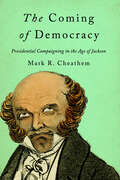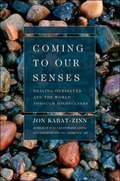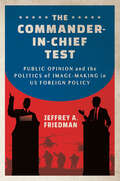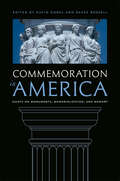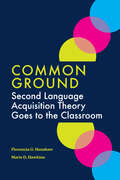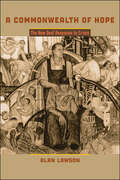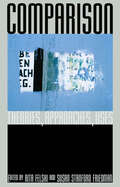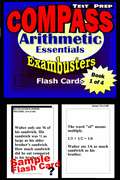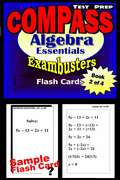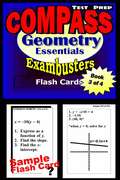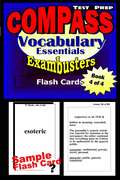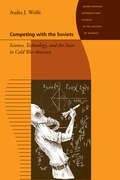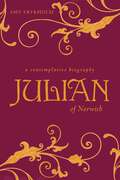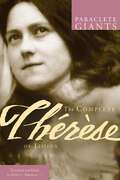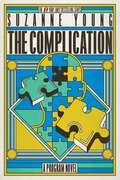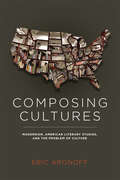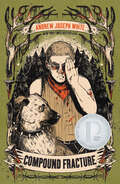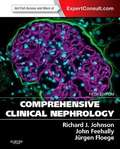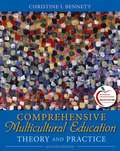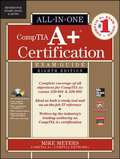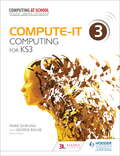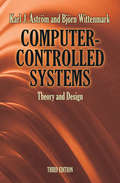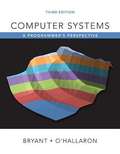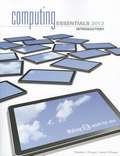- Table View
- List View
The Coming of Democracy: Presidential Campaigning in the Age of Jackson
by Mark R. CheathemA look at the evolution of presidential campaigning from 1824 to 1840. If you think politics are uncivil now...Winner of the Phi Alpha Theta History Honor Society Best Subsequent Book Award by the Phi Alpha Theta History Honor SocietyAfter the "corrupt bargain" that awarded John Quincy Adams the presidency in 1825, American politics underwent a fundamental shift from deference to participation. This changing tide eventually propelled Andrew Jackson into the White House—twice. But the presidential race that best demonstrated the extent of the changes was that of Martin Van Buren and war hero William Henry Harrison in 1840. Harrison’s campaign was famously marked by sloganeering and spirited rallies. In The Coming of Democracy, Mark R. Cheathem examines the evolution of presidential campaigning from 1824 to 1840. Addressing the roots of early republic cultural politics—from campaign biographies to songs, political cartoons, and public correspondence between candidates and voters—Cheathem asks the reader to consider why such informal political expressions increased so dramatically during the Jacksonian period. What sounded and looked like mere entertainment, he argues, held important political meaning. The extraordinary voter participation rate—over 80 percent—in the 1840 presidential election indicated that both substantive issues and cultural politics drew Americans into the presidential selection process.Drawing on period newspapers, diaries, memoirs, and public and private correspondence, The Coming of Democracy is the first book-length treatment to reveal how presidents and presidential candidates used both old and new forms of cultural politics to woo voters and win elections in the Jacksonian era. This book will appeal to anyone interested in US politics, the Jacksonian/antebellum era, or the presidency.
Coming to Our Senses: Healing Ourselves and the World Through Mindfulness
by Jon Kabat-ZinnFrom the bestselling author and renowned mindfulness teacher, scientist, and educator . . . a guide to living a meaningful life.This follow-up to the widely praised national bestseller Wherever You Go, There You Are is yet another revolutionary offering from Jon Kabat-Zinn, showing readers how the power of mindfulness can bring radical change to their lives.In the national bestseller Wherever You Go, There You Are, Jon Kabat-Zinn struck a chord in contemporary society that continues to reverberate to this day. It has been embraced by politicians, business leaders, and celebrities and endures as a classic with readers. In his groundbreaking new book, Dr. Kabat-Zinn teaches us how to harness the power of mindfulness to effect profound change in our personal lives and in the world.As stress continues to exact a toll on everyday life, people are increasingly turning to ancient, meditative methods, which have been tested by science, to relieve the ill effects and become more focused, healthy, and proactive. Kabat-Zinn has been for decades at the forefront of this mind/body movement and the revolution in medicine and health care it has spawned, demystifying it and bringing it into the mainstream. In Coming to Our Senses, he shares how every human has the capacity to mobilize deep, innate resources for continual learning, growing, healing, and transformation through mindfulness.Woven into eight parts, Coming to Our Senses uses anecdotes and stories from Kabat-Zinn's own life experiences and work in his clinic to illustrate healing possibilities. At its core, the book offers remarkable insight into how to use the five senses--touch, hearing, sight, taste, and smell, plus awareness itself--as a path to a healthier, saner, and more meaningful life.This is the definitive book for our time on the connection between mindfulness, health, and our physical and spiritual well-being.
The Commander-in-Chief Test: Public Opinion and the Politics of Image-Making in US Foreign Policy (Cornell Studies in Security Affairs)
by Jeffrey A. FriedmanIn The Commander-in-Chief Test, Jeffrey A. Friedman offers a fresh explanation for why Americans are often frustrated by the cost and scope of US foreign policy—and how we can fix that for the future.Americans frequently criticize US foreign policy for being overly costly and excessively militaristic. With its rising defense budgets and open-ended "forever wars," US foreign policy often appears disconnected from public opinion, reflecting the views of elites and special interests rather than the attitudes of ordinary citizens.The Commander-in-Chief Test argues that this conventional wisdom underestimates the role public opinion plays in shaping foreign policy. Voters may prefer to elect leaders who share their policy views, but they prioritize selecting presidents who seem to have the right personal attributes to be an effective commander in chief. Leaders then use hawkish foreign policies as tools for showing that they are tough enough to defend America's interests on the international stage. This link between leaders' policy positions and their personal images steers US foreign policy in directions that are more hawkish than what voters actually want.Combining polling data with survey experiments and original archival research on cases from the Vietnam War through the occupations of Iraq and Afghanistan, Friedman demonstrates that public opinion plays a surprisingly extensive—and often problematic—role in shaping US international behavior. With the commander-in-chief test, a perennial point of debate in national elections, Friedman's insights offer important lessons on how the politics of image-making impacts foreign policy and how the public should choose its president.
Commemoration in America: Essays on Monuments, Memorialization, and Memory
by David Gobel Daves RossellCommemoration lies at the poetic, historiographic, and social heart of human community. It is how societies define themselves and is central to the institution of the city. Addressing the complex ways that monuments in the United States have been imagined, created, and perceived from the colonial period to the present, Commemoration in America is a wide-ranging volume that focuses on the role of remembrance and memorialization in American urban life. The volume’s contributors are drawn from a spectrum of disciplines—social and urban history, urban planning, architecture, art history, preservation, and architectural history—and take a broad view of commemoration. In addition to the making of traditional monuments, the essays explore such commemorative acts as building preservation, biography, portraiture, ritual performance, street naming, and the planting of trees.Providing an overview of American memorialization and the impulses behind it, Commemoration in America emphasizes a universal tendency for individuals and groups to use monuments to define their contemporary social identity and to construct historical narratives. The volume shows that while commemorative acts and objects affect the community in fundamental ways, their meaning is always multivalent and conflicted, attesting to both triumphs and tragedies. Constituting a vital part of both individual and national identity, commemoration’s contradictions strike at the core of American identity and speak to the importance of remembrance in the construction of our diverse national cultural landscape.Contributors: Jhennifer A. Amundson, Judson University * Catherine W. Bishir, North Carolina State University Libraries * Thomas J. Campanella, University of North Carolina at Chapel Hill * Glenn T. Eskew, Georgia State University * Glenn Forley, Parsons / The New School for Design * Sally Greene, University of North Carolina at Chapel Hill * Alison K. Hoagland, Michigan Technological University * Lynne Horiuchi, University of California, Berkeley * Ellen M. Litwicki, SUNY Fredonia * David Lowenthal, University College London * Mark A. Peterson, University of California, Berkeley * Richard M. Sommer, University of Toronto * Dell Upton, University of California, Los Angeles
Common Ground: Second Language Acquisition Theory Goes to the Classroom
by Florencia G. Henshaw Maris D. Hawkins&“Common Ground is accessible to teachers at all levels yet firmly rooted in current questions of second language acquisition (SLA). One of its primary strengths is the authors themselves, both of whom are accomplished language teachers who understand the challenges and opportunities in communication-focused language teaching. Their experience, expertise, insight, and enthusiasm for language teaching translate into a book that is refreshingly practical for teachers, especially teachers who are striving to break from traditional drills commonly presented in textbooks. I hope this book finds its way into the hands of every language teacher who is looking for concrete examples of how SLA principles meet the realities of the classroom."—Stacey Margarita Johnson, Vanderbilt University
A Commonwealth of Hope: The New Deal Response to Crisis (The American Moment)
by Alan LawsonDid the New Deal represent the true American way or was it an aberration that would last only until the old order could reassert itself? This original and thoughtful study tells the story of the New Deal, explains its origins, and assesses its legacy. Alan Lawson explores how the circumstances of the Great Depression and the distinctive leadership of Franklin D. Roosevelt combined to bring about unprecedented economic and policy reform. Challenging conventional wisdom, he argues that the New Deal was not an improvised response to an unexpected crisis, but the realization of a unique opportunity to put into practice Roosevelt’s long-developed progressive thought. Lawson focuses on where the impetus and plans for the New Deal originated, how Roosevelt and those closest to him sought to fashion a cooperative commonwealth, and what happened when the impulse for collective unity was thwarted. He describes the impact of the Great Depression on the prevailing system and traces the fortunes of several major social sectors as the drive to create a cohesive plan for reconstruction unfolded. He continues the story of these main sectors through the last half of the 1930s and traces their legacy down to the present as crucial challenges to the New Deal have arisen. Drawing from a wide variety of scholarly texts, records of the Roosevelt administration, Depression-era newspapers and periodicals, and biographies and reflections of the New Dealers, Lawson offers a comprehensive conceptual base for a crucial aspect of American history.
Comparison: Theories, Approaches, Uses
by Rita Felski & Susan Stanford FriedmanAn extended volume of New Literary History that considers the practice of comparison in literary studies and other disciplines within the humanities.Writing and teaching across cultures and disciplines makes the act of comparison inevitable. Comparative theory and methods of comparative literature and cultural anthropology have permeated the humanities as they engage more centrally with the cultural flows and circulation of past and present globalization. How do scholars make ethically and politically responsible comparisons without assuming that their own values and norms are the standard by which other cultures should be measured? Comparison expands upon a special issue of the journal New Literary History, which analyzed theories and methodologies of comparison. Six new essays from senior scholars of transnational and postcolonial studies complement the original ten pieces. The work of Gayatri Chakravorty Spivak, Ella Shohat, Robert Stam, R. Radhakrishnan, Bruce Robbins, Ania Loomba, Haun Saussy, Linda Gordon, Walter D. Mignolo, Shu-mei Shih, and Pheng Cheah are included with contributions by anthropologists Caroline B. Brettell and Richard Handler. Historical periods discussed range from the early modern to the contemporary and geographical regions that encompass the globe. Ultimately, Comparison argues for the importance of greater self-reflexivity about the politics and methods of comparison in teaching and in research.
COMPASS Test Prep Flash Cards: Arithmetic Essentials (Exambusters COMPASS Workbook #1 of 4)
by Ace Inc.<P><P><i>Advisory: Bookshare has learned that this book offers only partial accessibility. We have kept it in the collection because it is useful for some of our members. Benetech is actively working on projects to improve accessibility issues such as these.</i><P><P> 600 questions and answers highlight essential arithmetic definitions, problems, and concepts. <P><P>Topics: Addition, Subtraction, Multiplication, and Division of Whole Numbers; Fractions and Decimals, Multiplication Tables, Word Problems, Percents, Measurement, Metric System, Square Roots and Powers, Real Numbers, Properties of Numbers <P> Exambusters COMPASS Prep Workbooks provide comprehensive, fundamental COMPASS review--one fact at a time--to prepare students to take practice COMPASS tests. Each COMPASS study guide focuses on one specific subject area covered on the COMPASS exams. From 300 to 600 questions and answers, each volume in the COMPASS series is a quick and easy, focused read. Reviewing COMPASS flash cards is the first step toward more confident COMPASS preparation and ultimately, higher COMPASS exam scores!
COMPASS Test Prep Flash Cards: Algebra Essentials (Exambusters COMPASS Workbook #2 of 4)
by Ace Inc.<P><P><i>Advisory: Bookshare has learned that this book offers only partial accessibility. We have kept it in the collection because it is useful for some of our members. Benetech is actively working on projects to improve accessibility issues such as these.</i><P><P> 450 questions and answers that highlight introductory algebra definitions, problems, and concepts. <P><P>Topics: Algebraic Concepts, Sets, Variables, Exponents, Properties of Numbers, Simple Equations, Signed Numbers, Monomials, Polynomials, Additive and Multiplicative Inverse, Word Problems, Prime Numbers, Factoring, Algebraic Fractions, Ratio and Proportion, Variation, Radicals, Quadratic Equations <P> Exambusters COMPASS Prep Workbooks provide comprehensive, fundamental COMPASS review--one fact at a time--to prepare students to take practice COMPASS tests. Each COMPASS study guide focuses on one specific subject area covered on the COMPASS exams. From 300 to 600 questions and answers, each volume in the COMPASS series is a quick and easy, focused read. Reviewing COMPASS flash cards is the first step toward more confident COMPASS preparation and ultimately, higher COMPASS exam scores!
COMPASS Test Prep Flash Cards: Geometry Essentials (Exambusters COMPASS Workbook #3 of 4)
by Ace Inc.<P><P><i>Advisory: Bookshare has learned that this book offers only partial accessibility. We have kept it in the collection because it is useful for some of our members. Benetech is actively working on projects to improve accessibility issues such as these.</i><P><P> 450 questions and answers that focus on essential geometry theorems, postulates, concepts, and definitions. Includes complementary diagrams. <P><P>Topics: Lines and Angles, Triangles, Proofs, Perpendicular Lines, Parallel Lines, Angle Sums, Quadrilaterals, Medians, Altitudes and Bisectors, Circles, Ratio and Proportion, Similar Polygons, Circles and Regular Polygons, Coordinate Geometry <P> Exambusters COMPASS Prep Workbooks provide comprehensive, fundamental COMPASS review--one fact at a time--to prepare students to take practice COMPASS tests. Each COMPASS study guide focuses on one specific subject area covered on the COMPASS exams. From 300 to 600 questions and answers, each volume in the COMPASS series is a quick and easy, focused read. Reviewing COMPASS flash cards is the first step toward more confident COMPASS preparation and ultimately, higher COMPASS exam scores!
COMPASS Test Prep Flash Cards: Vocabulary Essentials (Exambusters COMPASS Workbook #4 of 4)
by Ace Inc.<P><P><i>Advisory: Bookshare has learned that this book offers only partial accessibility. We have kept it in the collection because it is useful for some of our members. Benetech is actively working on projects to improve accessibility issues such as these.</i><P><P> 500 essential words every student should know. Includes sample sentence, part of speech, pronunciation, succinct, easy-to-remember definition, and common synonyms and antonyms. <P><P> Exambusters COMPASS Prep Workbooks provide comprehensive, fundamental COMPASS review--one fact at a time--to prepare students to take practice COMPASS tests. Each COMPASS study guide focuses on one specific subject area covered on the COMPASS exams. From 300 to 600 questions and answers, each volume in the COMPASS series is a quick and easy, focused read. Reviewing COMPASS flash cards is the first step toward more confident COMPASS preparation and ultimately, higher COMPASS exam scores!
Competing with the Soviets: Science, Technology, and the State in Cold War America (Johns Hopkins Introductory Studies in the History of Science)
by Audra J. WolfeA synthetic account of how science became a central weapon in the ideological Cold War.Honorable Mention for the Forum for the History of Science in America Book Prize of the Forum for the History of Science in AmericaFor most of the second half of the twentieth century, the United States and its allies competed with a hostile Soviet Union in almost every way imaginable except open military engagement. The Cold War placed two opposite conceptions of the good society before the uncommitted world and history itself, and science figured prominently in the picture. Competing with the Soviets offers a short, accessible introduction to the special role that science and technology played in maintaining state power during the Cold War, from the atomic bomb to the Human Genome Project.The high-tech machinery of nuclear physics and the space race are at the center of this story, but Audra J. Wolfe also examines the surrogate battlefield of scientific achievement in such diverse fields as urban planning, biology, and economics; explains how defense-driven federal investments created vast laboratories and research programs; and shows how unfamiliar worries about national security and corrosive questions of loyalty crept into the supposedly objective scholarly enterprise.Based on the assumption that scientists are participants in the culture in which they live, Competing with the Soviets looks beyond the debate about whether military influence distorted science in the Cold War. Scientists’ choices and opportunities have always been shaped by the ideological assumptions, political mandates, and social mores of their times. The idea that American science ever operated in a free zone outside of politics is, Wolfe argues, itself a legacy of the ideological Cold War that held up American science, and scientists, as beacons of freedom in contrast to their peers in the Soviet Union. Arranged chronologically and thematically, the book highlights how ideas about the appropriate relationships among science, scientists, and the state changed over time.
The Complete Julian of Norwich (Paraclete Giants)
by John JulianThe most engaging and complete collection available of this beloved 14th century English mysticThe Revelations of Julian of Norwich is the first book written in English by a woman – in this case, by a 14th century recluse who recounts the poignant, subtle, and radical insights granted to her in sixteen visions of the crucified Christ as she lay on what was believed to be her deathbed. Julian's miraculous recovery from that illness then led to twenty more years of reflection and contemplation on those revelations and finally to her writing a detailed account of her mystical experience. Her work – in the same Middle English as her contemporary Geoffrey Chaucer – is dense, deeply intuitive, and theologically complex. The Complete Julian is the first book to offer a modern translation of all of Julian's writings (including her complete Revelations), a complete analysis of her work, as well as original historical, religious, and personal background material that helps the reader comprehend the depth and profundity of her life and work. "[Julian's Revelations] may well be the most important work of Christian reflection in the English language." — Rowan Williams, Archbishop of Canterbury
The Complete Therese of Lisieux (Paraclete Giants)
by Robert J. Edmonson Therese of LisieuxThe most complete and engaging one-volume introduction to the "Little Flower" Following a thorough introduction to the saint's life, The Complete Therese presents her classic, The Story of a Soul, in complete and unabridged form. Then, unique to this edition is a portion of the original edition rarely seen, describing the saint's final days as seen through the eyes of the Sisters of the Lisieux Carmel; plus a poignant collection of over seventy firsthand anecdotes about ThÉrÈse recounted by the Sisters following her death. Also included a comprehensive selection of prayers, letters, and poems written by Therese, and in both French and English, the poem that inspired her to call herself the "Little Flower." Further appendices give important dates for her life, taking the reader up to 1997, one hundred years after her death, when Pope John Paul II declared her to be a Doctor of the Church. Beautiful engravings and photographs throughout the book give the reader a view of the Little Flower's childhood home and family, her growing-up years, life at Carmel, her death, and the original gravesite. Millions of hearts have been touched by St. ThÉrÈse of Lisieux's desire, not to be mighty and great, but to be a humble, little flower that would gladden God's eyes as he glances down at his feet. Now, yours will be, too.
The Complication: The Program; The Treatment; The Remedy; The Epidemic; The Adjustment; The Complication (Program #6)
by Suzanne YoungTatum and Weston seek revenge against The Program in this heart-pounding final installment in Suzanne Young&’s New York Times bestselling Program series—now with a reimagined look.Every cure has a cost. Tatum Masterson learned this after years of being monitored by The Program. She witnessed it when her boyfriend, Weston, came back changed, erased. The Adjustment came into Tatum&’s life just when she thought she needed it most, a promise for Wes to get back his forgotten memories. But when the procedure went wrong, a revelation shattered everything Tatum thought she knew. Now with no one left to trust, Tatum must find out what really happened last summer. With the help of the boyfriend she lost, Tatum digs into the past and future of The Program and its handlers. Will the two teens be able to bring about the reckoning their tormentors deserve?
Composing Cultures: Modernism, American Literary Studies, and the Problem of Culture (Cultural Frames, Framing Culture)
by Eric AronoffThe term "culture" has become ubiquitous in both academic and popular conversations, but its usefulness is a point of dispute. Taking the current shift from cultural studies to aesthetics as the latest form of this discussion, Eric Aronoff contends that in American modernism, the concepts of culture and of aesthetics have always been inseparable. The modernist concept of culture, he argues, arose out of an interdisciplinary dialogue about value, meaning, and form among social critics, artists, anthropologists, and literary critics, including figures as diverse as Van Wyck Brooks, Edward Sapir, Willa Cather, Lewis Mumford, John Crowe Ransom, Raymond Weaver, and Allen Tate. These figures proposed new ways to conceive of culture that intertwined theories of aesthetic and literary value with theories of national, racial, and regional identity. Through close readings, Aronoff shows that disciplines and approaches that are often thought of as opposed—cultural anthropology and aesthetics, American literary history and literary criticism, and multiculturalism and regionalism—are in fact engaged in common debate and proceed from shared arguments about culture and form.
Compound Fracture
by Andrew Joseph WhiteA queer Appalachian thriller that pulls no punches—following a trans autistic teen who's drawn into the generational struggle between the rural poor and those who exploit them. <P><P> The limited-quantity first printing of this powerful novel features specially-designed endpapers with photos of West Virginia coal mines from The Library of Congress! <P><P> On the night Miles Abernathy—sixteen-year-old socialist and proud West Virginian—comes out as trans to his parents, he sneaks off to a party, carrying evidence that may finally turn the tide of the blood feud plaguing Twist Creek: Photos that prove the county’s Sheriff Davies was responsible for the so-called “accident” that injured his dad, killed others, and crushed their grassroots efforts to unseat him. <P><P> The feud began a hundred years ago when Miles’s great-great-grandfather, Saint Abernathy, incited a miners’ rebellion that ended with a public execution at the hands of law enforcement. Now, Miles becomes the feud’s latest victim as the sheriff’s son and his friends sniff out the evidence, follow him through the woods, and beat him nearly to death. <P><P> In the hospital, the ghost of a soot-covered man hovers over Miles’s bedside while Sheriff Davies threatens Miles into silence. But when Miles accidently kills one of the boys who hurt him, he learns of other folks in Twist Creek who want out from under the sheriff’s heel. To free their families from this cycle of cruelty, they’re willing to put everything on the line—is Miles? <P><P> A visceral, unabashedly political page-turner that won’t let you go until you’ve reached the end, Compound Fracture is not for the faint of heart, but it is for every reader who's ready to fight for a better world. Hand this story to teens pushing for radical change. <p> <b>New York Times Bestseller</b>
Comprehensive Clinical Nephrology
by Richard J. Johnson John Feehally Jurgen FloegeHandle the toughest clinical challenges with Comprehensive Clinical Nephrology. The world's leading authorities in the field, Drs. Richard J. Johnson, John Feehally, Jürgen Floege and a team of international experts have meticulously updated this fifth edition to continue to provide the level of expert information that readers rely on from this classic reference. The right amount of basic science and practical clinical guidance assists in making efficient and informed decisions. Extensive updates on key topics keep you at the forefront of the field. New chapters on glomerulonephritis associated with complement disorders, interventional treatments for hypertension, renal disease and cancer, and epidemiology and prognostic impact of acute kidney injury.
Comprehensive Multicultural Education: Theory and Practice (7th Edition)
by Christine I. BennettWritten for new teachers, this guide to multicultural education presents interdisciplinary content through primary source material and vignettes of actual teachers and students. Providing an in-depth focus in key areas as well as a broad overview, Christine Bennett aims to help prepare teachers who are informed and caring advocates for students from all cultural, racial, socioeconomic, linguistic, and national backgrounds.
Comptia A+ Certification All-In-One Exam Guide (Exams 220-801 & 220-802)
by Michael MeyersThe bestselling CompTIA A+ reference and test preparation guide--fully revised for the new 2012 exam topics Written by the leading authority on CompTIA A+ certification and training, the new edition of this trusted resource offers complete, up-to-date coverage of CompTIA A+ exams 220-801 and 220-802. You'll find learning objectives at the beginning of each chapter, exam tips, practice exam questions, and in-depth explanations. Prepare for the exams with confidence! McGraw-Hill is a Gold-Level CompTIA Authorized Partner offering Authorized CompTIA Approved Quality Content to give you the competitive edge on exam day. This comprehensive guide also serves as an essential on-the-job reference after certification. Covers all exam objectives, including how to: Work with CPUs, RAM, BIOS settings, motherboards, power supplies, and other PC components Install, configure, and troubleshoot hard drives Manage input devices and removable media Install, upgrade, and troubleshoot Windows XP, Windows Vista, and Windows 7 Troubleshoot all common PC problems Install video and multimedia cards Work with smartphones, tablets, and other mobile devices Install and configure wired and wireless networks Connect to the Internet Protect your PC and your network Install, configure, and manage printers Work with virtualization technologies Understand safety and environmental issues Electronic content includes: Practice exams for 801 & 802 with hundreds of questions More than one hour of free video training from Mike Meyers A collection of Mike's latest favorite shareware and freeware PC tools and utilities Adobe Digital Edition eBook--free download (subject to Adobe's system requirements)
Computational Complexity
by Sanjeev Arora Boaz BarakThis beginning graduate textbook describes both recent achievements and classical results of computational complexity theory. Requiring essentially no background apart from mathematical maturity, the book can be used as a reference for self-study for anyone interested in complexity, including physicists, mathematicians, and other scientists, as well as a textbook for a variety of courses and seminars. More than 300 exercises are included with a selected hint set.
Compute-IT: Student's Book 3 - Computing for KS3
by Mark Dorling George RouseCompute-IT will help you deliver innovative lessons for the new Key Stage 3 Computing curriculum with confidence, using resources and meaningful assessment produced by expert educators. With Compute-IT you will be able to assess and record students' attainment and monitor progression all the way through to Key Stage 4. Developed by members of Computing at School, the national subject association for Computer Science, and a team of Master Teachers who deliver CPD through the Network of Excellence project funded by the Department for Education, Compute-IT provides a cohesive and supportive learning package structured around the key strands of Computing. Creative and flexible in its approach, Compute-IT makes Computing for Key Stage 3 easy to teach, and fun and meaningful to learn, so you can:Follow well-structured and finely paced lessons along a variety of suggested routes through Key Stage 3Deliver engaging and interesting lessons using a range of files and tutorials provided for a range of different programming languages Ensure progression throughout Key Stage 3 with meaningful tasks underpinned by unparalleled teacher and student support Assess students' work with confidence, using ready-prepared formative and summative tasks that are mapped to meaningful learning outcomes and statements in the new Programme of StudyCreative and flexible in its approach, Compute-IT makes Computing for Key Stage 3 easy to teach, and fun and meaningful to learn. This is the third title in the Compute-IT course, which comprises three Student's Books, three Teacher Packs and a range of digital teaching and learning resources delivered through Dynamic Learning.
Computer-Controlled Systems: Theory and Design (Dover Books on Electrical Engineering)
by Dr Karl J Åström Björn WittenmarkPractically all modern control systems are based upon microprocessors and complex microcontrollers that yield high performance and functionality. This volume focuses on the design of computer-controlled systems, featuring computational tools that can be applied directly and are explained with simple paper-and-pencil calculations. The use of computational tools is balanced by a strong emphasis on control system principles and ideas. Extensive pedagogical aids include worked examples, MATLAB macros, and a solutions manual (see inside for details).The initial chapter presents a broad outline of computer-controlled systems, followed by a computer-oriented view based on the behavior of the system at sampling instants. An introduction to the design of control systems leads to a process-related view and coverage of methods of translating analog designs to digital control. Concluding chapters explore implementation issues and advanced design methods.
Computer Systems: A Programmer's Perspective, Third Edition
by Randal E. Bryant David R. O'HallaronThis book (known as CS: APP) is for computer scientists, computer engineers, and others who want to be able to write better programs by learning what is going on "under the hood" of a computer system.
Computing Essentials 2013 Introductory Edition: Make IT Work for You
by Timothy J. O'Leary Linda I. O'LearyComputing Essentials 2013 allows you to Make IT Work for You through relevant Explorations, Ethics and Environment themes throughout each chapter.
